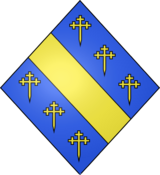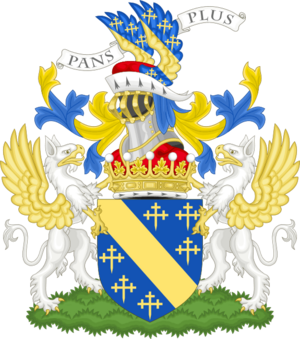Margaret of Mar, 31st Countess of Mar facts for kids
Quick facts for kids
The Countess of Mar
|
|
|---|---|

|
|
| Member of the House of Lords | |
|
Lord Temporal
|
|
| In office 11 September 1975 – 11 November 1999 as a hereditary peer |
|
| Preceded by | The 30th Earl of Mar |
| Succeeded by | Seat abolished |
| In office 11 November 1999 – 1 May 2020 as an elected hereditary peer |
|
| Preceded by | Seat established |
| Succeeded by | The 9th Baron Londesborough |
| Personal details | |
| Born |
Margaret Alison Lane
19 September 1940 |
| Political party | Crossbench |
| Spouses |
Edwin Noel Artiss
(m. 1959; div. 1976)John Salton
(m. 1976; div. 1981)John Jenkin
(m. 1982) |
| Children | Susan Mar, Mistress of Mar |
| Parents |
|
Margaret Alison of Mar, 31st Countess of Mar (born 19 September 1940) is a Scottish noblewoman and politician. She holds the oldest noble title in the United Kingdom, the earldom of Mar. A noble title that is passed down through a family is called a hereditary peerage.
For many years, she was a member of the House of Lords, which is one of the two houses of the British Parliament. She was a crossbench member, which means she did not belong to any political party. She was also a farmer and made special cheese from goat's milk.
Contents
Early Life and Family
Margaret was born Margaret Alison Lane. Her father was James Clifton Lane, who later became the 30th Earl of Mar. When her father was officially recognized with the title "of Mar" in 1959, his children also took on this name.
Margaret had a younger brother, David, and a younger sister, Janet. Her brother David was expected to inherit the title. However, he sadly died in 1967. This made Margaret the new heir to her father's earldom.
Becoming the Countess of Mar
When her father died in 1975, Margaret became the 31st Countess of Mar. This made her a member of the House of Lords. She is the only woman to hold an earldom in her own right, which is known as a suo jure countess.
In 1999, a new law called the House of Lords Act 1999 changed the rules. Most hereditary peers lost their seats in the House of Lords. However, 92 of them were elected to stay. The Countess of Mar received the most votes and kept her seat. She retired from the House of Lords on 1 May 2020.
Work in Politics and Public Life
The Countess of Mar was very active in the House of Lords. She held several important roles, including:
- Deputy Speaker, where she would lead sessions when the main speaker was not available.
- Member of committees that looked at issues like the environment, farming, and public health.
Outside of politics, she was involved in many organizations. She was the president of the Guild of Agricultural Journalists and a patron for groups that helped disabled people and veterans. She is also an honorary associate of the Royal College of Veterinary Surgeons.
Advocacy for Health Issues
In 1989, the Countess of Mar became ill after being exposed to strong chemicals while dipping her sheep. These chemicals are called organophosphates. She was later diagnosed with chronic fatigue syndrome, an illness that causes long-term pain and tiredness.
After her diagnosis, she used her position in the House of Lords to help others. She pushed the government to support people with similar long-term illnesses. She also worked to make the use of chemicals like organophosphates safer.
She started an organization called Forward-ME. This group helps coordinate charities that support people with chronic fatigue syndrome, also known as myalgic encephalomyelitis (ME).
Personal Life
The Countess of Mar has been married three times. She has one daughter from her first marriage, Susan Helen of Mar. Susan is the Mistress of Mar, which means she is the heir to the earldom. Lady Susan is married and has two daughters.
Arms
See also
- House of Lords
- House of Lords Act 1999
- List of members of the House of Lords
 | Charles R. Drew |
 | Benjamin Banneker |
 | Jane C. Wright |
 | Roger Arliner Young |



